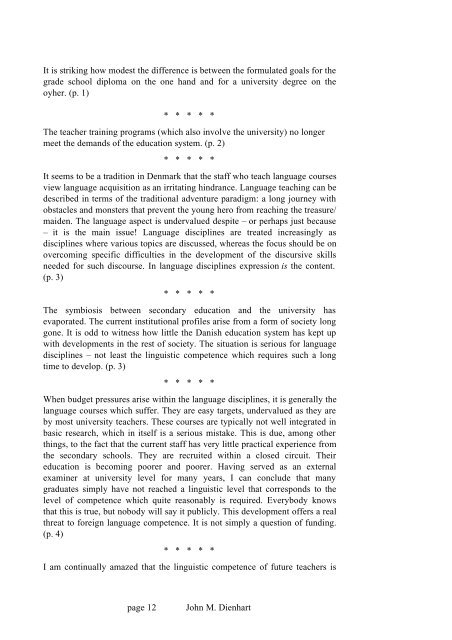Download - VISL
Download - VISL
Download - VISL
Create successful ePaper yourself
Turn your PDF publications into a flip-book with our unique Google optimized e-Paper software.
It is striking how modest the difference is between the formulated goals for the<br />
grade school diploma on the one hand and for a university degree on the<br />
oyher. (p. 1)<br />
* * * * *<br />
The teacher training programs (which also involve the university) no longer<br />
meet the demands of the education system. (p. 2)<br />
* * * * *<br />
It seems to be a tradition in Denmark that the staff who teach language courses<br />
view language acquisition as an irritating hindrance. Language teaching can be<br />
described in terms of the traditional adventure paradigm: a long journey with<br />
obstacles and monsters that prevent the young hero from reaching the treasure/<br />
maiden. The language aspect is undervalued despite – or perhaps just because<br />
– it is the main issue! Language disciplines are treated increasingly as<br />
disciplines where various topics are discussed, whereas the focus should be on<br />
overcoming specific difficulties in the development of the discursive skills<br />
needed for such discourse. In language disciplines expression is the content.<br />
(p. 3)<br />
* * * * *<br />
The symbiosis between secondary education and the university has<br />
evaporated. The current institutional profiles arise from a form of society long<br />
gone. It is odd to witness how little the Danish education system has kept up<br />
with developments in the rest of society. The situation is serious for language<br />
disciplines – not least the linguistic competence which requires such a long<br />
time to develop. (p. 3)<br />
* * * * *<br />
When budget pressures arise within the language disciplines, it is generally the<br />
language courses which suffer. They are easy targets, undervalued as they are<br />
by most university teachers. These courses are typically not well integrated in<br />
basic research, which in itself is a serious mistake. This is due, among other<br />
things, to the fact that the current staff has very little practical experience from<br />
the secondary schools. They are recruited within a closed circuit. Their<br />
education is becoming poorer and poorer. Having served as an external<br />
examiner at university level for many years, I can conclude that many<br />
graduates simply have not reached a linguistic level that corresponds to the<br />
level of competence which quite reasonably is required. Everybody knows<br />
that this is true, but nobody will say it publicly. This development offers a real<br />
threat to foreign language competence. It is not simply a question of funding.<br />
(p. 4)<br />
* * * * *<br />
I am continually amazed that the linguistic competence of future teachers is<br />
page 12<br />
John M. Dienhart
















